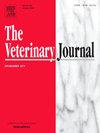大麻(Cannabis sativa L.)提取物籽油对小动物兽医皮肤病多重耐药病原菌的体外抗菌活性研究。
IF 3.1
2区 农林科学
Q1 VETERINARY SCIENCES
引用次数: 0
摘要
由于可用于治疗多重耐药细菌引起的感染的治疗方案有限,兽医小动物皮肤科迫切需要替代抗菌疗法。本研究旨在评估大麻(大麻sativa L.)种子油局部治疗皮肤局部感染的潜力,如外耳炎。采用肉汤微量稀释法测定与皮肤感染相关的细菌病原体菌株,包括假中间葡萄球菌(120株)、金黄色葡萄球菌(48株)和铜绿假单胞菌(26株)。采用棋盘稀释试验评价了大麻籽油与庆大霉素和恩诺沙星两种用于治疗外耳炎的抗菌剂的相互作用,并采用细胞3-(4,5-二甲基噻唑-2-基)-2,5-二苯基溴化四唑(MTT)对小鼠成纤维细胞系L929的体外细胞毒性评价。葡萄球菌的最低抑菌浓度(mic)为0.025 ~ 0.2% v/v,显著低于铜绿假单胞菌(mic) (0.00 ~ 0.4% v/v)。在假中间球菌中,耐甲氧西林菌株的敏感性低于敏感菌株。大麻籽油与庆大霉素具有协同作用(分数抑制浓度指数< 0.5),使耐庆大霉素假中间葡萄球菌的MIC(≥16µg/ml)低于临床药敏临界点(≤4µg/ml)。浓度低于2% v/v时,细胞活力无变化。这些发现表明,大麻籽油可能是一种有效和安全的替代或辅助常规抗菌剂,用于治疗由葡萄球菌引起的外耳炎和其他皮肤局灶性感染,包括耐甲氧西林菌株。本文章由计算机程序翻译,如有差异,请以英文原文为准。
In vitro antibacterial activity of hemp (Cannabis sativa L.) extract seed oil against multidrug resistant bacterial pathogens in small animal veterinary dermatology
There is an urgent need for alternative antimicrobial therapies in veterinary small animal dermatology due to the limited therapeutic options available for treatment of infections caused by multidrug-resistant bacteria. This study aimed to evaluate the potential of hemp (Cannabis sativa L.) seed oil for topical treatment of localized infections of the skin, such as otitis externa. Antimicrobial activity was determined by broth microdilution using a strain collection of bacterial pathogens associated with skin infections, including Staphylococcus pseudintermedius (n = 120), Staphylococcus aureus (n = 48), and Pseudomonas aeruginosa (n = 26). Checkerboard dilution tests were used to assess the interaction of hemp seed oil with two antimicrobials used for management of otitis externa, gentamicin and enrofloxacin, while in vitro cytotoxicity was evaluated by the cellular 3-(4,5-dimethylthiazol-2-yl)-2,5-diphenyltetrazolium bromide (MTT) reduction assay on mouse fibroblast cell line L929. Minimum inhibitory concentrations (MICs) in staphylococci (0.025–0.2 % v/v) were markedly lower than in P. aeruginosa (>0.4 % v/v). Within S. pseudintermedius, methicillin-resistant strains displayed lower susceptibility compared to susceptible strains. Hemp seed oil showed synergy with gentamicin (Fractional Inhibitory Concentration Index < 0.5), reducing the MIC of gentamicin-resistant S. pseudintermedius strains (≥16 µg/ml) below the clinical susceptibility breakpoint (≤4 µg/ml). No changes in cell viability were observed at concentrations below 2 % v/v. These findings suggest that hemp seed oil could be an effective and safe alternative or adjuvant to conventional antimicrobials for managing otitis externa and other skin focal infections caused by staphylococci, including methicillin-resistant strains.
求助全文
通过发布文献求助,成功后即可免费获取论文全文。
去求助
来源期刊

Veterinary journal
农林科学-兽医学
CiteScore
4.10
自引率
4.50%
发文量
79
审稿时长
40 days
期刊介绍:
The Veterinary Journal (established 1875) publishes worldwide contributions on all aspects of veterinary science and its related subjects. It provides regular book reviews and a short communications section. The journal regularly commissions topical reviews and commentaries on features of major importance. Research areas include infectious diseases, applied biochemistry, parasitology, endocrinology, microbiology, immunology, pathology, pharmacology, physiology, molecular biology, immunogenetics, surgery, ophthalmology, dermatology and oncology.
 求助内容:
求助内容: 应助结果提醒方式:
应助结果提醒方式:


